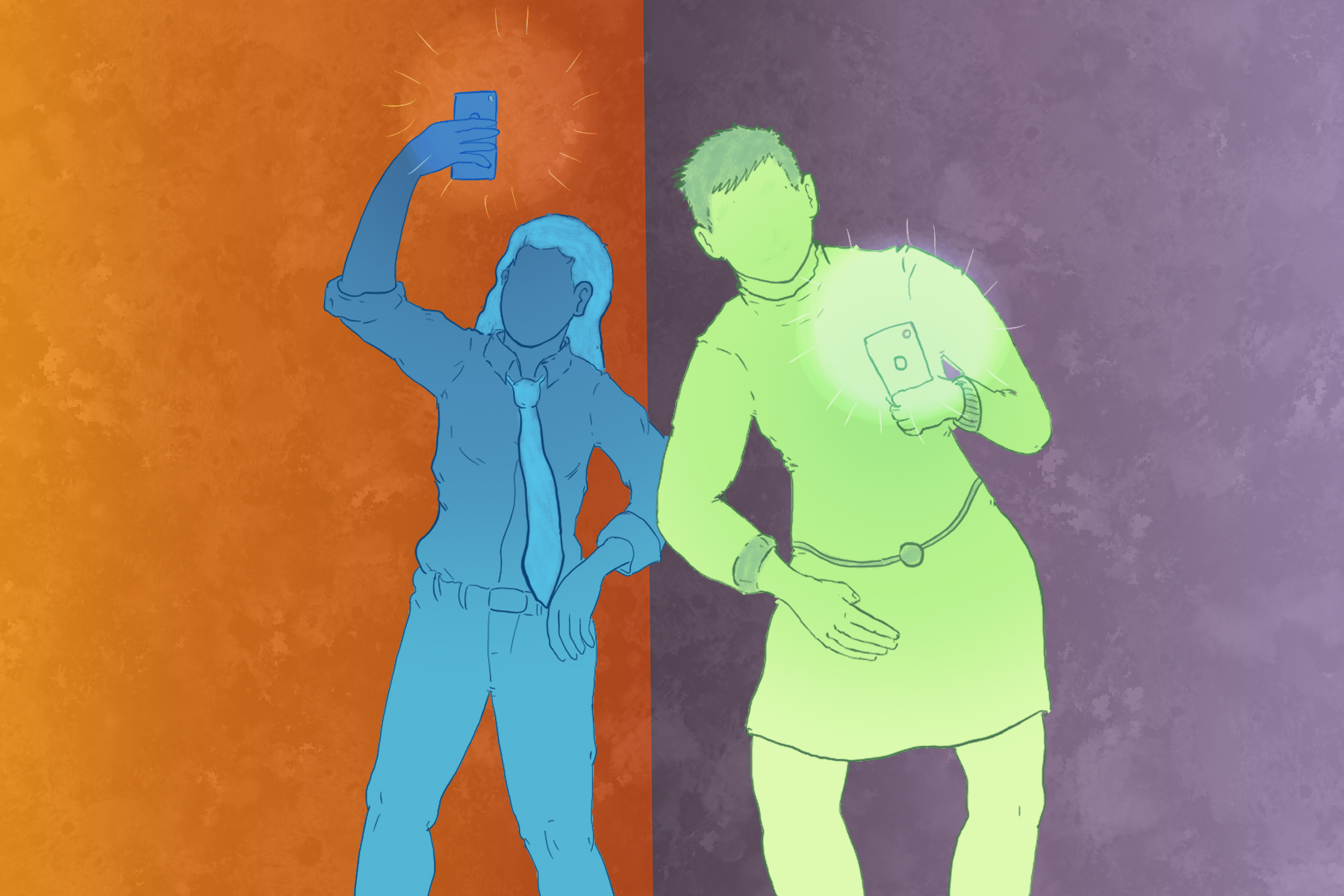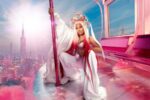There’s yet another social media trend: the flip challenge. Created early last month, it didn’t take long for it to turn into an overnight sensation. How did it start? Savannah Walsh from Elle noted that one of the sources for the flip challenge started with a couple’s account: @dallinxbella. She also found that the challenge actually started almost two years ago, in November 2018. The compilations have been getting posted on YouTube since December 2018.
The challenge is for two people, typically a couple. They play Drake’s song “Nonstop” from one of his most popular albums, “Scorpion.” One person holds the camera and the other dances, while Drake sings “I just flipped the switch. Flip, flip.” That’s when the light switches off, then on again, to unveil the couple’s switched outfits.
Thousands of people participated in the challenge, along with many celebrities, including Jennifer Lopez and Alex Rodriguez, Elizabeth Warren and Kate McKinnon, Camila Cabello, Emily Ratajkowski and multiple others.
https://www.instagram.com/p/B9deEqUFS2e/?utm_source=ig_web_copy_link
When it came to heterosexual couples doing the challenge, some of them matched the trend’s literal requirements and switched their exact clothes. Others did variations, such as Jennifer Lopez and her fiancé — which makes sense, considering how much bigger Rodriguez is, yet he still played along and changed to similar feminine clothes.
Others didn’t want to wear their female significant other’s clothing, such as comedian Mr. Kevonstage and Brooklyn rapper Casanova. This is a theme of black humor, and it plays a big part in the black community. However, even though their challenges were still funny, this illuminated an important issue: hypermasculinity.
Hypermasculinity Versus Toxic Masculinity
First and foremost, before we get into the topic, let’s define the difference between hypermasculinity and toxic masculinity, so there’s no confusion between the two.
Hypermasculinity is defined as the exaggeration of male stereotypical behavior, such as an emphasis on physical strength, aggression and sexuality.
Toxic masculinity is defined as the adherence to traditional male gender roles that consequently stigmatize and limit the emotions that boys and men can comfortably express. It basically means the promotion of the stereotype that “real men” never show emotion, and they exhibit strength all the time.
Hypermasculinity in Hip-Hop
Many people participated in the flip challenge, and even though some didn’t do it all the way, they effortlessly joined in on the fun. However, some heavily criticized the challenge. One who got recognition for this was none other than Atlanta born and raised rapper, Waka Flocka Flame.
During the high point of the trend, he posted on Instagram “This flip the switch challenge making me realize a lot.” His caption stated: “Not for promo. Not for comedy and damn sure not for a f–king challenge. Where’s the be a real man challenge it’s like being feminine a wave please stay WOKE.”
https://www.instagram.com/p/B9wilBagern/?utm_source=ig_web_copy_link
Obviously, Flocka made it blatantly clear that he and his wife Tammy were not going to be part of the flip challenge. FNR TIGG from Complex noted, “Waka’s comments were flooded with people suggesting that he’s promoting ‘toxic masculinity.’”
This is nothing new of course, considering that most black male rappers are hypermasculine. A lot of artists in the genre grew up on the streets and had to fight all their lives just to survive. When this became the cultural norm for hip-hop, even those who grew up in a decent environment took on this hardcore gangster persona because it sells to the public.
The idea of black men being animals has stemmed from centuries of racist ideology. The reason why black people are still talking about slavery to this day is because its effects are still occurring and still detrimental to the black community.
As Harry Richardson from The Odyssey explains, this “is internalized within European racism. Historically, Black men were equated to being animalistic and barbaric, ultimately seen as sexually menacing and susceptible to raping white women because of Black men savage ways.” And if you’re treated like an animal all your life, sooner or later, that’s how you’re going to see yourself. It’s basic psychology.
He explains that hypermasculinity in the black community didn’t come out of nowhere. It was placed like a shackle to bring down the black community; it’s what caused a majority of the unnecessary rivalries and deaths of so many hip-hop artists.
Look at Biggie versus Tupac, one of the biggest musical beefs to hit the earth. It was also two of the biggest unfortunate blows to hit the black community since Malcolm X and Martin Luther King Jr.
Now, I’m not trying to compare two rappers to two visionary activists — not to mention, Malcolm X and Martin Luther King Jr. had completely different ideologies and weren’t rivals. I’m just trying to show how black people are continuing to be used as target practice, including black men that not only uplift and change the black community, but speak to the entire world, no matter the skin color.
And we’re still losing artists: Nipsey Hussle and Pop Smoke in less than a year. One was a pillar to the community and the other was too young and just getting started.
Richardson also speaks about how hypermasculinity promotes rape culture, misogyny and male dominance, which sounds very similar to the troves of popular hip-hop songs.
Now I admit, I am one of the many that listen to the songs previously described. That being said, it’s one thing to express yourself through music about a life you know; it’s another to glorify something that you wouldn’t want to live through knowing that you would change it if given the chance.
A lot of hip-hop songs not only encourage violence, but drug abuse as well, which kills a countless number of people and celebrities.
A New Generation Is Changing What It Means to Be Masculine
Luckily for the black community, a new generation is trying to change that. G Herbo is acknowledging his PTSD and rapping about it. Roddy Ricch’s music is about his anti-social tendencies. Lil Baby opens up about being hurt beyond repair in his song “Emotionally Scarred.”
A new generation of female rappers is entering the industry as well, such as Megan Thee Stallion, Mulatto, Dreezy and countless others. They use their bodies for empowerment and as a weapon, not a weakness — not solely for the male gaze. They’re bold, loud, have bars and flow just like the boys. They’re proving that exerting strength is not about masculinity; it’s about confidence. It isn’t just a male trait.
Around the same time the flip challenge was trending, Lil Yachty dropped the video for “Oprah’s Bank Account.” He was dressed like Oprah and did a whole rendition of Oprah’s talk show. Although many, including me, thought it was hilarious, he also received a lot of backlash for wearing a dress. XXL showcases all the backlash, which was disappointing because it wasn’t only men calling him out, but women as well.
Let’s not forget one of the most legendary black characters in black TV: Sheneneh. She was created and played by iconic comedian Martin Lawrence. And there is no question of his heterosexuality, even when in women’s clothing. He broke down doors for black TV with that sitcom and left a legacy for not only himself but black people in general.
Madea, played by Tyler Perry, and Big Mama, also played by Martin Lawrence, are two of the most prominent matriarchs on the screen. There is an obvious double standard; if a female artist was dressed as a man she wouldn’t get nearly as much backlash, if any. Before women were allowed to be actresses, men were playing both female and male roles.
Reggaeton — basically Spanish hip-hop — is starting to break records in the hip-hop world, and even though he’s not black, I would like to give an honorable mention to Bad Bunny. He flawlessly dressed as a woman in Yo Perreo Sola and has been defying gender norms since he broke into the music industry. At the end of the day, it’s all about having fun.
With all this being said, I wouldn’t call hypermasculinity in hip-hop culture toxic. Mainly because, personally, I haven’t had the black male experience. Although we like to make it seem like it’s the same, living as a black woman and being a black man is not the same. They’re both filled with struggle and strife because of racism, but just because they’re really similar doesn’t mean they’re the same — due to sexism. However, this doesn’t mean it can’t be fixed to better the community.
















